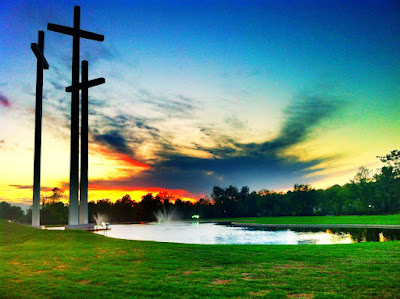 |
| Blest Day! |
Hail Thee, Festival Day is a 1906 Anglican minister,
Maurice F. Bell (1862-1947) translation of the Latin processional hymn for Easter,
Salve Festa Dies (sung by
Schola Gregoriana Mediolanensis in the 2nd video) by
Venantius Fortunatus (c.530-c.609). After recovering from an eye ailment, in 565 he embarked on a pilgrimage from his native Italy to the
Shrine of St. Martin of Tours, from whose intercession he attributed the healing. He became an important poet in the
Merovingian Court and was eventually appointed
Bishop of Poitiers. Although often referred to as a "Saint", he has never been formally canonized by the Church. The tune,
Salve, Festa Dies was composed for Bell's text in 1906 by
Ralph Vaughan Williams (1872-1958). In the Liturgy of the Hours,
Hail Thee, Festival Day is used at
Easter,
Ascension, and
Pentecost.
Tune: Salve, Festa Dies
HAIL THEE, FESTIVAL DAY by Maurice Bell, 1906 (Public Domain)
EASTER REFRAIN:
Hail thee, festival day!
Blessed day to be hallowed forever;
Day when our Lord was raised,
Breaking the kingdom of death.
ASCENSION REFRAIN:
Hail thee, festival day!
Blessed day to be hallowed forever;
Day when our risen Lord
Rose in the heavens to reign.
PENTECOST REFRAIN:
Hail thee, festival day!
Blessed day to be hallowed forever;
Day when the Holy Ghost
Shone in the world full of grace.
2. Lo, the fair beauty of the earth,
From the death of the winter arising!
Every good gift of the year
Now with its Master returns.
3. He who was nailed to the cross
Is Ruler and Lord of all people.
All things created on earth
Sing to the glory of God.
4. Daily the loveliness grows,
Adorned with glory of blossom;
Heaven her gates unbars,
Flinging her increase of light.
5. Rise from the grave now,
O Lord,
The author of life and creation.
Treading the pathway of death,
New life You give to us all.
6. God the Almighty Lord,
The Ruler of earth and the heavens,
Guard us from harm without;
Cleanse us from evil within.
7. Jesus the health of the world,
Enlighten our minds, great
Redeemer,
Son of the Father supreme,
Only begotten of God.
8. Spirit of life and of power,
Now flow in us, fount of our being,
Light that enlightens us all,
Life that in all may abide.
9. Praise to the giver of good!
O lover and author of concord,
Pour out your balm on our days;
Order our ways in your peace.
SALVE, FESTA DIES by Venantius Fortunatus (Public Domain)
REFRAIN:
Salve, festa dies, toto venerabilis aevo. qua deus infernum vicit et astra tenet
1. Ecce renascentis testatur gratia mundi omnia cum domino dona redisse suo.
2. Namque triumphanti post tristia Tartara Christo undique fronde nemus, gramina flore favent.
3. Legibus inferni oppressis super astra meantem laudant rite deum lux polus arva fretum.
4. Qui crucifixus erat, deus ecce per omnia regnat, dantque creatori cuncta creata precem. salve, festa
dies.
5. Christe salus rerum, bone conditor atque redemptor, unica progenies ex deitate patris.
6. Qui genus humanum cernens mersisse profundo, ut hominem eriperes es quoque factus homo
7. Nec voluisti etenim tantum te corpore nasci, sed caro quae nasci, pertulit atque mori
8. Fexequias pateris vitae auctor et orbis, intras mortis iter dando salutis opem.
9. Tristia cesserunt infernae vincula legis expavitque chaos luminis ore premi.
10. Depereunt tenebrae Christi fulgore fugatae et tetrae noctis pallia crassa cadunt.
11. Pollicitam sed redde fidem, precor, alma potestas: tertia lux rediit, surge, sepulte meus.
12. Non decet. ut humili tumulo tua membra tegantur, neu pretium mundi vilia saxa premant.
13. Lintea, precor, sudaria linque sepulchro: tu satis es nobis et sine te nihil est.
14. Solvecatenatas inferni carceris umbras et revoca sursum quidquid ad ima ruit.
15. Redde tuam faciem, videant ut saecula lumen, redde diem qui nos te moriente fugit.
16. Sed plane inplesti remeans, pie victor, ad orbem: Tartara pressa iacent nec sua iura tenent.
17. Inferus insaturabiliter cava gruttura pandens, qui rapuit semper, fit tua praeda, deus.
18. Evomit absorptam trepide fera belua plebem et de fauce lupi subtrahit agrnus oves.
19. Rex sacer, ecce tui radiat pars magna triumphi, cum puras animas sancta lavacra beant
20. Candidus egreditur nitidis exercitus undis atque vetus vitium purgat in amne novo.
21. Fulgentes animas vestis quoque candida signat et grege de niveo gaudia pastor habet.






